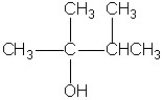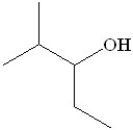Exam 14: Some Compounds With Oxygen, sulfur, or a Halogen
Exam 1: Matter and Measurements143 Questions
Exam 2: Atoms and the Periodic Table91 Questions
Exam 3: Ionic Compounds75 Questions
Exam 4: Molecular Compounds75 Questions
Exam 5: Classification and Balancing of Chemical Reactions53 Questions
Exam 6: Chemical Reactions: Mole and Mass Relationships46 Questions
Exam 7: Chemical Reactions: Energy, rates, and Equilibrium73 Questions
Exam 8: Gases, liquids, and Solids73 Questions
Exam 9: Solutions110 Questions
Exam 10: Acids and Bases102 Questions
Exam 11: Nuclear Chemistry88 Questions
Exam 12: Introduction to Organic Chemistry: Alkanes83 Questions
Exam 13: Alkenes, alkynes, and Aromatic Compounds85 Questions
Exam 14: Some Compounds With Oxygen, sulfur, or a Halogen94 Questions
Exam 15: Amines46 Questions
Exam 16: Aldehydes and Ketones77 Questions
Exam 17: Carboxylic Acids and Their Derivatives84 Questions
Exam 18: Amino Acids and Proteins78 Questions
Exam 19: Enzymes and Vitamins75 Questions
Exam 20: The Generation of Biochemical Energy66 Questions
Exam 21: Carbohydrates72 Questions
Exam 22: Carbohydrate Metabolism60 Questions
Exam 23: Lipids79 Questions
Exam 24: Lipid Metabolism58 Questions
Exam 25: Nucleic Acids and Protein Synthesis67 Questions
Exam 26: Genomics38 Questions
Exam 27: Protein and Amino Acid Metabolism47 Questions
Exam 28: Chemical Messengers: Hormones, neurotransmitters, and Drugs73 Questions
Exam 29: Body Fluids63 Questions
Select questions type
Ether molecules are polar,but do not form hydrogen bonds with other ether molecules because
(Multiple Choice)
4.8/5  (37)
(37)
Oxidation reactions are defined differently in organic chemistry than they are in inorganic chemistry.Give the definition of both and explain their similarities.
(Essay)
4.8/5  (41)
(41)
Which compound would you expect to have the lowest boiling point?
(Multiple Choice)
4.9/5  (36)
(36)
Which alcohol should be used to produce 2-methyl-3-pentene by dehydration?
(Multiple Choice)
4.9/5  (31)
(31)
Treatment of the molecule shown with a strong oxidizing agent will produce 
(Multiple Choice)
4.9/5  (31)
(31)
An alcohol is classified as primary,secondary or tertiary based on
(Multiple Choice)
4.8/5  (39)
(39)
All of the following properties of alcohols are affected by hydrogen bonding except
(Multiple Choice)
4.7/5  (37)
(37)
Which of the following is the major product formed from dehydration of the following alcohol? 
(Multiple Choice)
4.9/5  (36)
(36)
Treatment of CH3CH2OH with an excess amount of oxidizing agent will produce
(Multiple Choice)
4.8/5  (34)
(34)
What is the IUPAC name of the compound shown?
CH3CH2CH2OCH3
(Multiple Choice)
5.0/5  (30)
(30)
Which of the following alcohols would not be able to be oxidized with any type of oxidizing agent?
(Multiple Choice)
4.8/5  (40)
(40)
What is the product of the oxidation of a secondary alcohol?
(Multiple Choice)
4.8/5  (39)
(39)
Oxidation of an alcohol group results in formation of a(an)________ group.
(Multiple Choice)
4.8/5  (38)
(38)
Treatment of CH3CH2CH2OH with a limited amount of oxidizing agent will produce
(Multiple Choice)
4.8/5  (27)
(27)
None of the following organic compounds is very likely to form hydrogen bonds except
(Multiple Choice)
4.8/5  (36)
(36)
Showing 41 - 60 of 94
Filters
- Essay(0)
- Multiple Choice(0)
- Short Answer(0)
- True False(0)
- Matching(0)